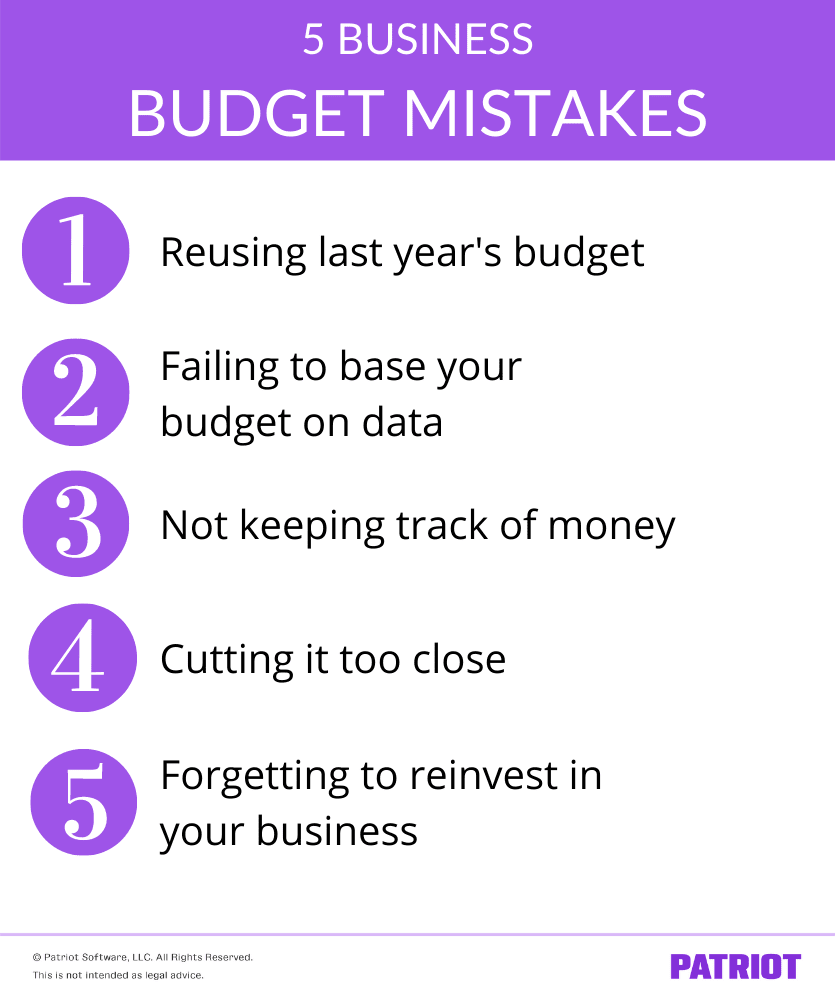A budget can act as a little roadmap to guide your business through the year. It can help you avoid overspending, make educated financial decisions, and stay organized. But if you aren’t careful, you could wind up making budget mistakes that negate all of these benefits.
Learn about common budgeting mistakes and what to do to steer clear of making them.
5 Budget mistakes
By now, you likely know how to create a business budget and how important doing so is each year. Without one, you play a lot of guessing games when it comes to your company’s finances.
But even if you’re a budget-creating veteran, you still may fall victim to common budgeting mistakes.

1. Reusing last year’s budget
Typically, you create your budget for the upcoming year at the end of the previous year. If you had a budget last year, you likely use it as a basis for your upcoming budget.
But, you can’t simply reuse last year’s budget.
Your previous year’s budget was based on different circumstances—especially if your business was impacted by something like the coronavirus, a natural disaster, or an economic downturn.
In addition to external circumstances, you probably change things up in your business that increase or decrease your income or expenses. Don’t forget to account for these changes!
Not to mention, a key part of running a business is pushing your business to meet goals. As your business grows, so do its goals. So, if you constantly look back rather than forward, you could wind up holding your business back.
Stretch your business when you set budget goals. Of course, you don’t want to cut it too close. But if you reuse your previous budget, you may not take steps to cut expenses and increase business revenue.
Try this instead: Take a look at your previous year’s budget, but don’t copy it verbatim. Look at whether you were able to stay on budget or not. Extract important data from the budget, which brings us to our next mistake…
2. Failing to base your budget on data
There’s a happy balance between ignoring your previous budget and relying solely on it. For the best chances of creating an accurate budget, try basing it on data.
Estimating your expenses and income may leave you going way over budget. Why base your budget on guesswork when you have historical data you could be using?
Rounding and guessing could end up costing you thousands of dollars at the end of the year. Not to mention, you might have to deal with additional expenses from surprises and emergencies.
Try this instead: List out your projected sales, fixed expenses, and variable expenses. Determine whether you plan on having the same expenses. Think about any changes you plan on making that could impact your income (e.g., new products).
Categorize your expenses and income. Allocate how much you think you’ll spend on each expense and receive from each revenue source.
3. Not keeping track of money
Do you spend hours putting together your budget, only to leave it sitting on a shelf for the year? If you do, you probably have no idea how your actual performance compares to your budget.
Tracking incoming and outgoing funds is key to making business decisions. Failing to do it is also one of the biggest budget mistakes. If you put your business’s books on the back burner, you could wind up overspending and missing opportunities to cut back on unnecessary expenses.
Try this instead: Consider opting for a reliable accounting software to streamline the way you track incoming and outgoing funds. That way, you can easily compare your business’s monthly profits or losses to your budget and tweak it for the following month.
4. Cutting it too close
Being positive is a great thing in business. But if you are optimistic when it comes to budget-planning, you could cut things too close.
Although you can predict fixed expenses, there are a number of variable expenses and things outside your control. Who could have predicted the coronavirus would sweep the nation and shutter businesses for months?
Try this instead: Leave yourself some wiggle room when budgeting. And, keep an emergency fund handy in case you still need some extra money.
Pay attention to your monthly profits or losses. If you’re way off budget, you might be able to cut back on expenses or take efforts to ramp up sales the following month.
5. Forgetting to reinvest in your business
If you want your business to grow, you need to reinvest extra money into it. But when you’re under-budget, it can be tempting to set that money aside.
Of course, paying down debts (e.g., business loans) and beefing up your emergency fund are important, too. But if all of your extra money goes to everything but your business, you could be missing out on key growth opportunities.
Try this instead: Take a look at any leftover funds you have at the end of each month (and year). Determine how much you can afford to reinvest into your business.
The key to budgeting is tracking your spending. With Patriot’s accounting software, you can do just that. Track your incoming and outgoing money, get free expert support, and more. What’s holding you back? Start your free trial now.
This is not intended as legal advice; for more information, please click here.
Leave a Reply